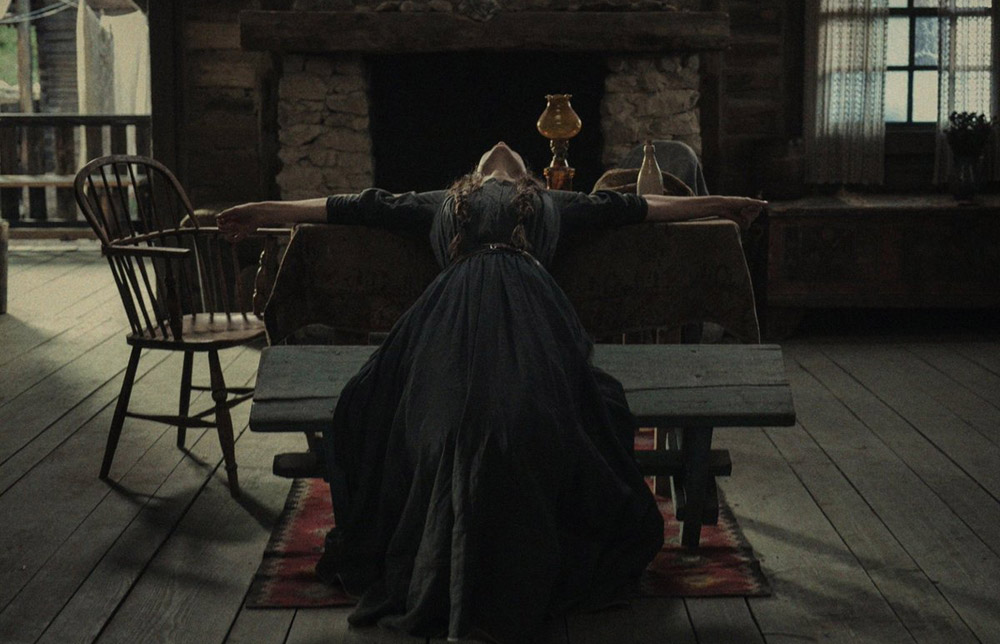There’s a moment early in “The World to Come” where you sense Abigail (Katherine Waterston) is covering up for her husband Dyer (Casey Affleck) when she recalls him saying “Contentment is a friend he never gets to see,” a suspiciously poetic description of his grief in the wake of the death of their four-year-old daughter Nellie. The thoughtfulness of the words don’t quite square with the gently salty and solemn farmer you see before you as Abigail, out of the camera’s sight, overwhelms the picture with her voice. In Mona Fastvold’s wry and winning adaptation of Jim Shepard’s short story, she is given complete control over her own narrative, able to share her thoughts freely with the audience as its narrator, yet even there she can’t shake serving Dyer’s best interests, often times when it means putting her own aside, an extension of how she lives on the range in 1856 where there’s little immediate social pressure to adhere to certain gender roles within a marriage, but they have been so psychologically ingrained for generations that they go unquestioned.
Anguished over the fact that Dyer can’t be bothered to include her in his journal — though to be fair, it’s used explicitly to keep track of expenses for the farm — Abigail is desperate to be acknowledged in one way or another. She is bestowed some measure of justice by Fastvold who allows Abigail’s voiceover to dominate much of “The World to Come,” but still governed by the decorum of the day. Her mind reels uninterrupted as you’re privy to scenes from her life with Dyer, a perfectly acceptable yet unexciting partner with whom she is both forever bonded and repelled by when she can’t help but be reminded of her daughter’s death from diphtheria. However, the film shrewdly takes notice when she starts saving her words for others besides the audience to hear, most specifically for Tallie (Vanessa Kirby), the ravishing redhead who has moved into a farm down the road that she’s rented with her husband Finney (Christopher Abbott).
It’s fitting that Tallie invites herself over to first meet Abigail when Finney is wantonly killing some hawks, an indication of the social skills he sorely lacks, and much like Abigail finds herself compensating for her husband’s shortcomings, Tallie is coming up with excuses for hers, providing an initial spark of a connection between the two that quickly turns into a full-on conflagration. With Shepard and Ron Hansen’s mellifluous and eminently quotable screenplay, throwing around words like “asperity” with abandon, the mere exchange of words summon passion once Abigail’s running monologue flourishes into a dialogue. Although Tallie makes Abigail’s imagination run wild, it doesn’t take much on the audience’s part to understand why, particularly when Kirby leaves this tantalizing air of mystique around her and despite being completely unguarded in her thoughts, Waterston is equally captivating when the burden of carrying all these publicly unsaid words is made clear aurally while she puts on a brave face for the camera.
In the largely straightforward tale of repressed desires, Fastvold cleverly works within certain creative restrictions she’s imposed on herself, turning the seemingly benign marking of time into a vivid articulation of how the days fly by once Abigail and Tallie are together and taking great care with the film’s sparse musical accompaniment, employing a lovely, versatile score from Daniel Blumberg that changes with the seasons where a wily clarinet usually comes to the fore, skittish during storms and soulful in the sun yet never entirely in one emotional register or another. Naturally with its setting on the plains, the possibilities seem endless with undeveloped land for miles in any one direction, but for as many gorgeous landscapes as cinematographer André Chemetoff captures throughout “The World to Come,” it is only when the mind begins to open up that the film reveals true beauty, and there it conquers new frontiers.
“The World to Come” will screen at the Venice Film Festival on September 6th at 11:30 am, 2 pm and 4:30 pm at the Sala Giardino and 7th at 11:30 am at the PalaBiennale and 10:15 pm at the Sala Perla.




